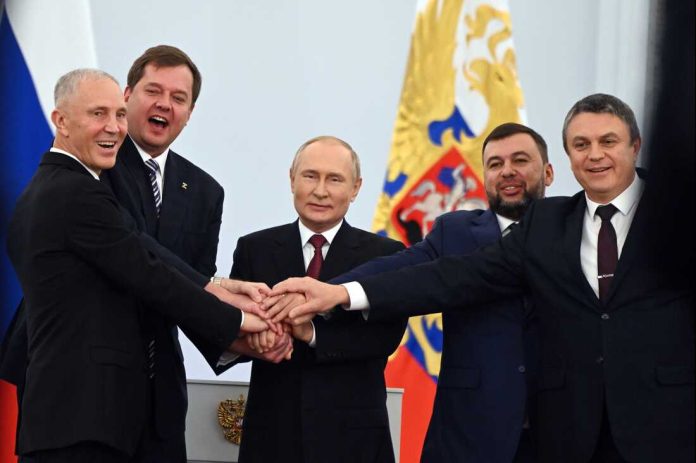Russia, which has many time zones, is seeking to integrate the regions after annexing them in September.
Law enforcement officers standing guard during a concert in Moscow in September marking the declared annexation of four Ukrainian regions.
Russia will switch four occupied areas of Ukraine to Moscow’s time zone, it said Friday, a shift that carries symbolic meaning far heavier than its practical effect as it highlights the Kremlin’s attempt to solidify control of the annexed regions.
Russia’s Ministry of Industry and Trade said in a statement that the four regions — Donetsk, Kherson, Luhansk and Zaporizhzhia — would switch to Moscow time “in the near future” as part of a process of “gradual synchronization of Russia’s legislature.” The regions are one hour behind Moscow now.
But Moscow has long had a particular focus on time zones, cherishing its own 11 divisions as a source of national pride. There is no rational justification for its having that many, experts say, and their multiplicity can lead to absurdities, particularly in its far east. When it is noon in Vladivostok, for example, it is 11 a.m. in Tokyo, even though it lies farther east.
So it was perhaps predictable that the Kremlin would seek to manipulate time zones in Ukraine as part of its “Russification” campaigns over the course of the war. These have involved forcing teachers to use a Russian curriculum, replacing local officials with occupation appointees, substituting the Ukrainian currency with the ruble and issuing Russian passports.
Moscow annexed the regions of Donetsk, Kherson, Luhansk and Zaporizhzhia in September, despite international condemnation and even as parts of the areas remained under Ukrainian control. Since then, President Vladimir V. Putin of Russia has been urging his government officials to speed up the process of integrating the regions into Russia’s economic, legal and social infrastructure.
“Russia needs to gain a solid foothold there,” he said in December at a meeting with young Russian scientists. “It means working on those territories and with those people so that the people feel the benefit of the accession to Russia.”
However, it promises to take far more than shifting to Moscow time for Russia to establish that perch in Ukraine, as the front lines continue to shift and few Russian officials, teachers or other municipal workers are willing to risk their lives by working there. Russia has had to resort to offering higher salaries for teachers in the regions, and several officials there have been targeted in attacks by pro-Ukrainian fighters.
On Thursday, Mikhail Mishustin, Russia’s prime minister, said that the four regions would be part of the Russian social insurance system, which issues payments to workers when they fall ill or become disabled. And on the same day, Russia’s Parliament approved a bill on integrating schools and universities in the regions into the Russian education system.
It remains to be seen what contribution the time switch will make in the effort to win over Ukrainian hearts and minds, when even Russians themselves are resistant to such changes. In 2009, Dmitri A. Medvedev, then Russia’s president, suggested eliminating some of Russia’s time zones as part of a broader modernization effort for Russia. His proposal went nowhere.













